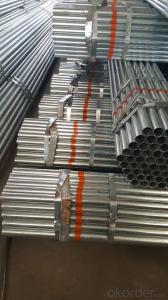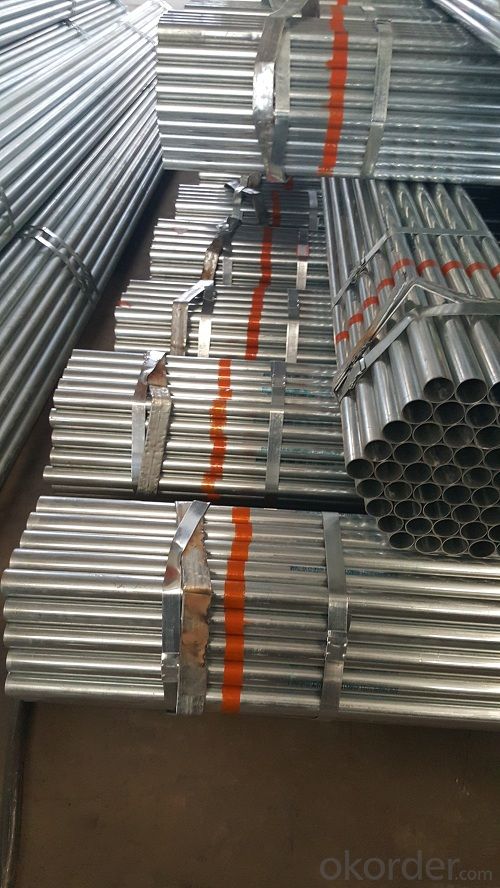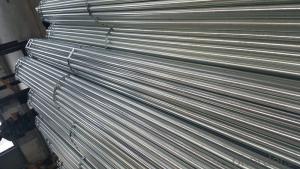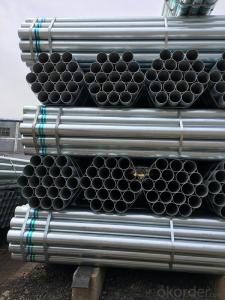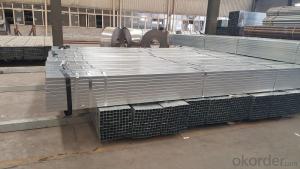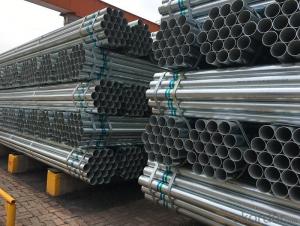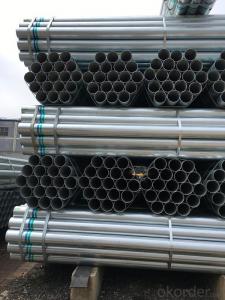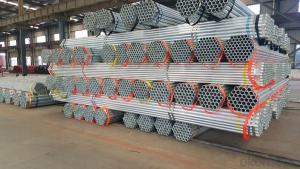Galvanized welded steel pipe for heating pipe
- Loading Port:
- Shanghai
- Payment Terms:
- TT OR LC
- Min Order Qty:
- 10 m.t.
- Supply Capability:
- 12000 m.t./month
OKorder Service Pledge
OKorder Financial Service
You Might Also Like
Specification
1、Structure of Galvanized welded steel pipe for heating pipe:
The surface of galvanized steel pipe welded steel pipe of hot dip galvanized layer or. Galvanized can increase the corrosion resistance of the steel tube, prolong service life. Galvanized pipe is widely used, in addition to water, gas, oil and other general low pressure fluid pipelines. It is also used in the petroleum industry, especially for offshore oil field of oil well pipe and oil pipe, chemical, coking equipment of oil heater, condensation cooler, coal run oil exchanger tube, and trestle pile, the mine tunnel support frame tube.
2、Main Features of Galvanized welded steel pipe for heating pipe:
• High manufacturing accuracy
• High strength
• Good visual effect
• Reasonable price
3、 Galvanized welded steel pipe for heating pipe Specification:
Standard | GB, DIN, ASTM ASTM A106-2006, ASTM A53-2007 |
Grade | 10#-45#, 16Mn 10#, 20#, 45#, 16Mn |
Thickness | 1 - 33 mm |
Section Shape | Round |
Outer Diameter | 21 - 610mm |
Place of Origin | Tianjin, China (Mainland) |
Secondary Or Not | Non-secondary |
Application | Hydraulic Pipe |
Technique | Cold Drawn |
Certification | API |
Surface Treatment | factory state or painted black |
Special Pipe | API Pipe |
Alloy Or Not | Non-alloy |
Length | 5-12M |
Outer Diameter | 21.3-610mm |
Grade | 20#, 45#, Q345, API J55, API K55, API L80, API N80, API P110, A53B |
Standard | ASME, ASTM |
1) Material:Q195 Q235 Q345 X42 X52
2) Specification range:OD:21.3-610mm,WT:6-70mm,length:6-12m or according to the requirement of clients.
3) Excutive standards:GB,ASME API5L.ASTM A 106/A53,Despite of the above standards,we can also supply seamless steel pipe with standard of DIN,JIS,and so on,and also develop new products according to the requirements of our clients!
4) Surface: galvanized.
5) Ends:Beveled or square cut,plastic capped,painted.
6) Packing:bundles wrapped with strong steel strip,seaworthy packing.
4、Packaging & Delivery
Packaging Details: | seaworthy package,bundles wrapped with strong steel strip |
Delivery Detail: | 15-30days after received 30%TT |
5、FAQ of Galvanized welded steel pipe for heating pipe:
①How is the quality of your products?
Our products are manufactured strictly according to national and internaional standard, and we take a test
on every pipe before delivered out. If you want see our quality certifications and all kinds of testing report, please just ask us for it.
Guaranteed: If products’ quality don’t accord to discription as we give or the promise before you place order, we promise 100% refund.
②How about price?
Yes, we are factory and be able to give you lowest price below market one, and we have a policy that “ for saving time and absolutely honest business attitude, we quote as lowest as possible for any customer, and discount can be given according to quantity”,if you like bargain and factory price is not low enough as you think, just don’t waste your time.Please trust the quotation we would give you, it is professional one.
③Why should you chose us?
Chose happens because of quality, then price, We can give you both.Additionally, we can also offer professional products inquiry, products knowledge train(for agents), smooth goods delivery, exellent customer solution proposals.Our service formula: good quality+good price+good service=customer’s trust
SGS test is available, customer inspection before shipping is welcome, third party inspection is no problem.
6、 Galvanized welded steel pipe for heating pipe Images:
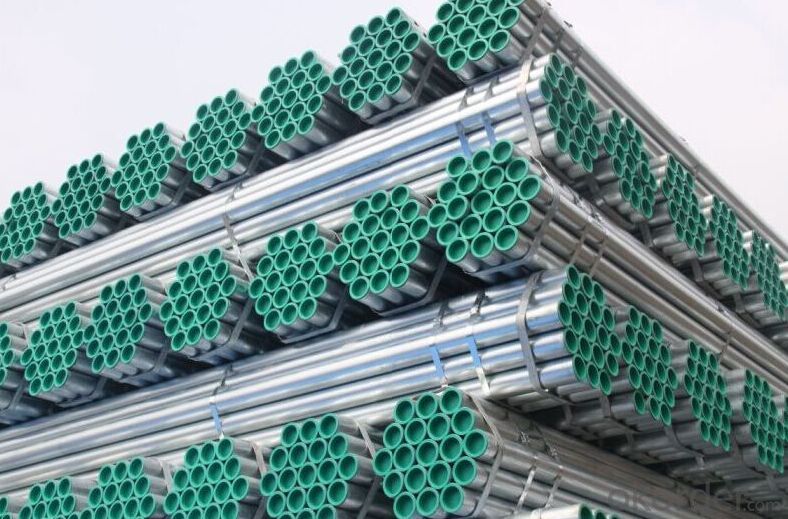
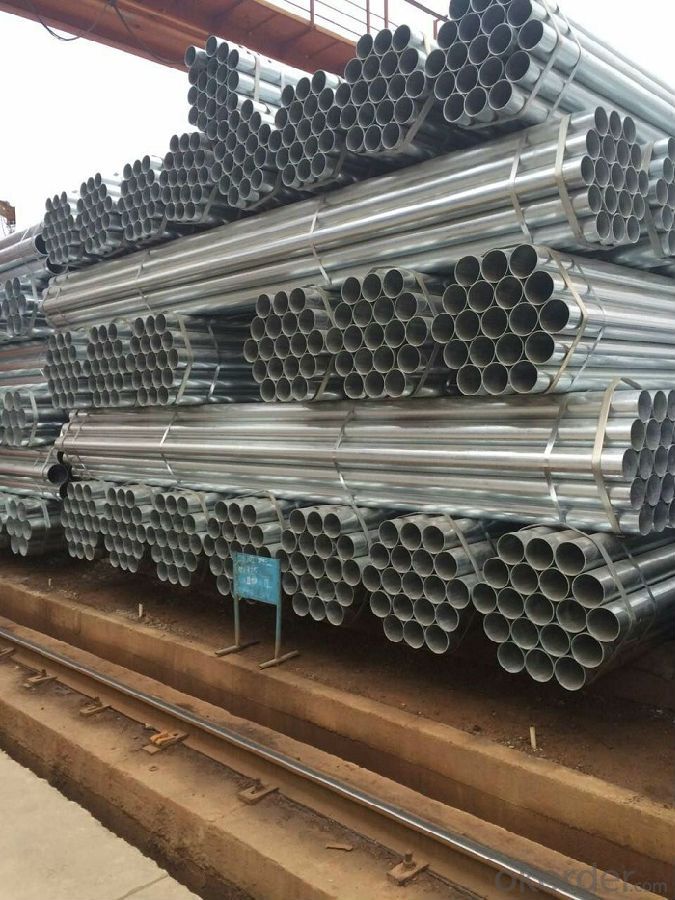
- Q: How do you inspect steel pipes for defects?
- The inspection of steel pipes for defects requires a methodical approach that combines visual examination, non-destructive testing (NDT) techniques, and specialized equipment. The following are the typical steps undertaken to inspect steel pipes for defects: 1. Visual Examination: Commence by visually inspecting the external surface of the pipe, searching for any visible indications of defects, including cracks, dents, or corrosion. Particular attention should be given to welds, joints, and areas prone to stress or damage. 2. Ultrasonic Testing (UT): Ultrasonic testing is commonly employed to identify internal defects in steel pipes. This technique involves transmitting ultrasonic waves into the pipe and then interpreting the echoes received. Any irregularities in the internal structure, such as cracks or voids, can be identified and analyzed. 3. Magnetic Particle Inspection (MPI): MPI is a widely utilized technique for detecting defects on or near the surface, such as cracks, seams, or other discontinuities. This method involves applying a magnetic field to the pipe and subsequently applying ferromagnetic particles (usually iron-based) to the surface. These particles accumulate and form visible indications at areas where magnetic flux leakage is caused by defects. 4. Eddy Current Testing (ECT): Eddy current testing is suitable for detecting surface and near-surface defects in conductive materials like steel. This technique involves inducing an alternating current into the pipe and monitoring changes in the electrical currents induced by any present defects. These changes are then analyzed to identify and evaluate the defects. 5. Radiographic Testing (RT): Radiographic testing is conducted by exposing the steel pipe to X-rays or gamma rays and capturing radiographic images of the pipe. This technique allows for the detection of internal defects, such as cracks, porosity, inclusions, or variations in wall thickness. The radiographic images are subsequently examined for any indications of defects. 6. Dye Penetrant Inspection (DPI): DPI is a method used to identify defects on the surface of steel pipes. It involves applying a liquid dye to the surface, which penetrates into any surface cracks or flaws. After sufficient time for the dye to seep in and react, excess dye is removed, and a developer is applied to draw out the dye from the defects, rendering them visible. 7. Pressure Testing: Pressure testing entails pressurizing the steel pipe to a predetermined level and monitoring for any pressure drops or leaks. This test ensures that the pipe can withstand the required pressure without any structural defects. It is worth noting that the choice of inspection technique depends on various factors, such as the type of defect being sought, the size and characteristics of the pipe, and the specific industry standards and regulations. Inspection professionals with expertise in NDT methods and equipment are typically employed to ensure precise and dependable results.
- Q: How are steel pipes used in the construction of desalination plants?
- Steel pipes are used in the construction of desalination plants for various purposes such as transporting seawater, brine, and treated water, as well as for structural support in the plant's infrastructure. These pipes are durable, corrosion-resistant, and capable of withstanding high-pressure conditions, making them ideal for the harsh and corrosive environment of desalination plants.
- Q: How are steel pipes protected against electrolytic corrosion?
- Various methods can be employed to safeguard steel pipes against electrolytic corrosion. One commonly utilized approach involves the application of protective coatings on the pipe's surface. These coatings serve as a barrier, effectively preventing direct contact between the steel and the surrounding environment, which may contain moisture and other corrosive substances. Epoxy, polyethylene, and zinc are frequently employed coatings for this purpose. Another means of protection involves the utilization of sacrificial anodes. These anodes, typically fabricated from a metal that exhibits greater reactivity than steel, such as zinc or aluminum, are affixed to the steel pipes. Over time, as these anodes corrode, they willingly sacrifice themselves in order to shield the steel. This process, known as cathodic protection, is exceptionally successful in deterring electrolytic corrosion. Aside from coatings and sacrificial anodes, proper insulation and electrical isolation play a pivotal role in preventing electrolytic corrosion of steel pipes. Insulating materials, such as rubber or plastic sleeves, are employed to prevent direct contact between the pipes and other metals or electrolytes. Electrical isolation can be achieved through the use of dielectric unions or insulating flanges, which effectively obstruct the flow of electric current between different sections of the pipeline. Furthermore, regular maintenance and inspection are essential components of protecting steel pipes against electrolytic corrosion. Regular checks to assess coating integrity, anode condition, and potential electrical leakage are crucial in maintaining the ongoing efficacy of the corrosion protection system. In conclusion, a combination of protective coatings, sacrificial anodes, insulation, electrical isolation, and regular maintenance is indispensable in safeguarding steel pipes against electrolytic corrosion. By implementing these measures, the lifespan of steel pipes can be substantially prolonged, thereby ensuring the safety and reliability of various applications, including water distribution, oil and gas transportation, and structural support in buildings and infrastructure.
- Q: What is the production process of seamless steel tube?
- Main production process of cold rolled (drawn) seamless steel tube:Blank preparation, pickling, lubrication, cold rolling (drawing), heat treatment, straightening, finishing and inspectionThe production process of seamless steel tube in general can be divided into two kinds of hot rolling and cold drawing, cold-rolled seamless steel pipe production process than hot-rolled billet to complex, first to three roller rolling and extrusion to sizing test, if the tube through the cutting machine cutting surface without crack growth response after cutting blank about one meter. Then enter the annealing process, annealing and pickling to use acid pickling liquid, should pay attention to the surface if there are a lot of bubbling, if there are a large number of bubbling pipe shows that the quality is not up to the standard. The appearance of cold rolling seamless steel tube shorter than hot-rolled seamless steel pipe, cold rolled seamless steel pipe wall thickness is generally higher than hot-rolled seamless steel pipe to be small, but the surface looks better than thick wall seamless steel pipe is more bright, rough surface is not too much, not too much burr diameter.
- Q: How are steel pipes used in tunnel construction?
- Steel pipes are used in tunnel construction as structural elements to provide support and stability to the tunnels. They are commonly used in tunnel lining systems to create a strong and durable structure that can withstand the pressure and weight of the surrounding soil or rock. Steel pipes are also used for ventilation systems, drainage systems, and for carrying utilities such as water, gas, or electricity through the tunnel.
- Q: How are steel pipes resistant to corrosion?
- Steel pipes are resistant to corrosion due to the protective layer formed on their surface. This layer, also known as a passive film, is created through the presence of chromium in the steel. It acts as a barrier, preventing oxygen and moisture from reaching the underlying metal, thus inhibiting the corrosion process. Additionally, steel pipes can also be coated with anti-corrosive materials like zinc or epoxy, providing an extra layer of protection against rust and other corrosive elements.
- Q: What is the difference between steel pipe and PVC pipe?
- Both steel pipe and PVC pipe are commonly utilized materials for plumbing and other construction purposes; however, they possess several distinct dissimilarities. To begin with, the materials themselves differ. Steel pipe is manufactured from a blend of iron and carbon, known as steel. This material is renowned for its robustness and durability, rendering it appropriate for high-pressure applications and subterranean installations. Conversely, PVC (polyvinyl chloride) pipe is crafted from a type of plastic called PVC. PVC pipe is characterized by its lightweight nature, flexibility, and ease of handling, making it a favored choice for residential plumbing and irrigation systems. Next, the installation process varies. Steel pipe necessitates skilled labor and specialized tools for cutting, threading, and welding. It frequently involves a complex installation procedure, particularly for larger pipe sizes. Conversely, PVC pipe can be effortlessly cut with a saw or specialized pipe cutter and joined together utilizing solvent cement or threaded fittings. This renders PVC pipe more suitable for DIY projects and simpler installations. Moreover, steel pipe incurs greater costs compared to PVC pipe. Steel is a pricier material, and the manufacturing process for steel pipe is more intricate, entailing multiple steps and additional materials. PVC pipe, as a plastic-based material, is generally less expensive and more cost-effective, particularly for smaller diameter applications. In terms of performance, steel pipe possesses greater tensile strength, can endure higher levels of pressure, and exhibits greater resistance to temperature fluctuations, rendering it ideal for heavy-duty and industrial applications. Conversely, PVC pipe possesses lower tensile strength but is resistant to corrosion, chemicals, and scale buildup. PVC pipe is commonly employed in residential plumbing, irrigation systems, and other non-industrial applications. To summarize, the primary disparities between steel pipe and PVC pipe revolve around the materials used, installation processes, costs, and performance characteristics. While steel pipe is sturdier and more suitable for heavy-duty applications, PVC pipe is lighter, easier to install, and more cost-effective for residential and non-industrial purposes.
- Q: Can steel pipes be used for irrigation systems?
- Yes, steel pipes can be used for irrigation systems. Steel pipes are known for their durability, strength, and resistance to corrosion, making them suitable for use in irrigation systems where they may be exposed to water and various environmental conditions. Additionally, steel pipes can handle high water pressure and are available in different sizes, allowing for efficient water distribution throughout the irrigation system.
- Q: How are steel pipes used in the marine industry?
- Steel pipes are commonly used in the marine industry for various applications such as shipbuilding, offshore oil and gas exploration, and marine infrastructure. They are utilized for constructing hulls, pipelines, and support structures due to their high strength, durability, and resistance to corrosion from seawater. Steel pipes also provide a reliable and efficient means of transporting fluids, gases, and other materials within marine vessels and structures.
- Q: How do you measure the thickness of a steel pipe?
- There are several ways to measure the thickness of a steel pipe. One common method is to use a specialized tool called a caliper or micrometer. This tool allows you to precisely measure the diameter of the pipe at various points, and by subtracting the inner diameter from the outer diameter, you can determine the thickness. Another approach is to use an ultrasonic thickness gauge, which uses sound waves to measure the thickness of the pipe. This non-destructive testing method is particularly useful for pipes that are already installed or are difficult to access. Additionally, you can also use a magnetic or eddy current thickness gauge, which relies on the principle of magnetism or electromagnetic induction to measure the thickness of the pipe.
Send your message to us
Galvanized welded steel pipe for heating pipe
- Loading Port:
- Shanghai
- Payment Terms:
- TT OR LC
- Min Order Qty:
- 10 m.t.
- Supply Capability:
- 12000 m.t./month
OKorder Service Pledge
OKorder Financial Service
Similar products
Hot products
Hot Searches
Related keywords
